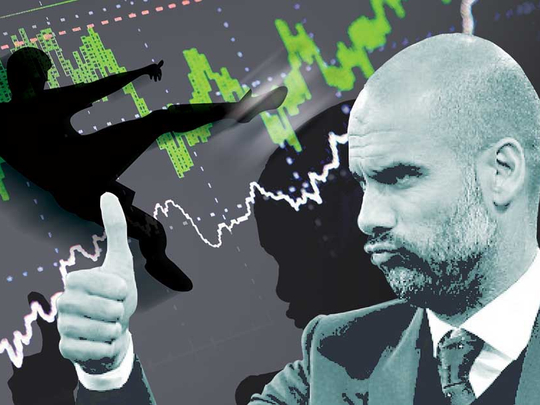
Getting the best out of your team is a challenge business leaders share with the world’s top football managers. And I’m a firm believer that corporate chiefs can learn from some of the beautiful game’s most successful coaches.
HR experts say staff are motivated best when their boss makes sure they understand the overall goals of the business, and make it clear what’s required from each individual, and how they should go about their job.
Successful business leaders are equally clear about how they want their team to work as a unit, and as we start a new business season in the Middle East I’m more convinced than ever that we can benefit from observing how the best football bosses operate.
Just before the start of the new Premier League season in the UK, the BBC asked professors at some of Europe’s leading business schools what techniques could be picked up from the club managers.
I was particularly interested in what academia felt about Pep Guardiola, whose arrival at Manchester City was greeted with such fanfare after his achievements at Barcelona and Bayern Munich.
According to Prof. Josep Franch, dean of Esade Business School, business leaders can learn from Guardiola’s ability to define a clear and simple vision for his team, and then execute that vision.
The secret is that Guardiola is very close to his players, and is a great role model who understands how to extract the best out of everyone, from five-times FIFA “World Player of the Year” Lionel Messi to raw teenagers.
Corporate chiefs I’ve known operate in a similar way. Like Guardiola, they have a transparency and style of communication which they use to set clear expectations for each member of their team, and to make sure everyone follows that collective idea.
Those who know him best say Guardiola observes and listens closely to what his players have to say. But there comes a time when, as a leader, you have to stop listening and put your plan into action. That can lead to making unpopular decisions, as Guardiola did when he sold fans’ favourite Ronaldinho during his time at Barcelona.
All corporate heads face the same kind of issues. Some handle them better than others and those who do it best, like Guardiola, develop the confidence that comes with success, and by sticking with their message earn the trust of those who work for them.
Many business leaders are big on attention to detail, and in that we can all learn from another new face in the Premier League — Antonio Conte who has taken over as the Chelsea manager.
I’m not suggesting CEOs should follow the Italian’s example and make their team members eat rhodiola rosea and goji berries as part of a balanced regime to keep energy levels high.
But other parts of his philosophy will strike a chord in the boardroom, not least his very direct style of getting his message across.
This, according to a fellow Italian, Prof. Andrea Sianesi of the school of business at the Politecnico di Milano, is the key to Conte’s success on the field, and it can help business leaders achieve success in other areas.
Using simple words to communicate what he wants from his team, the Italian has a self-belief which commands attention, and he is definitely not afraid to say it the way he sees it.
The result is that his players know that what he says is spot on, and they buy into his methods. By tapping in to their desire to win he achieves great results.
I’ve always been keen on building a family atmosphere among my team. In the business world, the bigger the company the tougher this is … but another of the Premiership managers has shown what a corporate chief might achieve by developing their abilities as a man-manager and master motivator.
ESMT Berlin’s Urs Mueller says fellow German Jurgen Klopp, the Liverpool manager, is a big believer in the “one for all, all for one” mentality.
His desire to make Liverpool feel like one big family is based on the culture he developed so successfully at Borussia Dortmund before arriving on Merseyside.
Mueller sees similarities with Virgin boss Richard Branson who runs his companies in a similar way, creating an atmosphere in which people work together not only because they share a common objective but because they like each other. He hasn’t done badly out of it.
The writer is Head of PA Consulting Group, Middle East and North Africa. All opinions expressed are his own.












